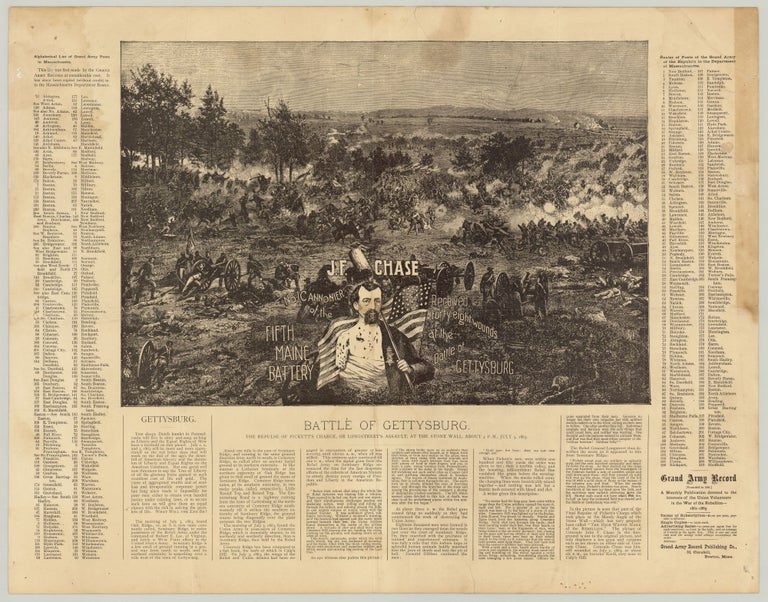J. F. Chase, No. 1 Cannonier of the Fifth Maine Battery. Received Forty-eight Wounds at the Battle of Gettysburg.
Boston: Grand Army Record Publishing Co., 31 Cornhill, [ca. 1888]. Illustrated broadside, 16.75” x 23” (overall); illustration 10.25” x 15”. CONDITION: Very good, old folds with a few small repairs with document repair tape to verso, several pin-holes at corners, toning to upper-right margin. A scarce Grand Army of the Republic broadside honoring veteran and Medal of Honor-recipient, John F. Chase, apparently in part to marshal support for 1888 presidential nominee William Harrison who supported veteran and disability pensions; with textual emphasis on Gettysburg and the G.A.R.’s Massachusetts wing. The Grand Army Record (est. 1885) was a monthly publication “devoted to the interests of the Union Volunteers in the War of the Rebellion.” The large illustration depicts “The Repulse of Pickett’s Charge, or Longstreet’s Assault” during the Battle of Gettysburg, upon which is superimposed an illustration of veteran John F. Chase (1843–1914) of the 5th Maine Battery, shown holding a cannon sponge over one shoulder, his bare wounded chest and truncated arm exposed, standing in front of the U.S. flag, and wearing his Medal of Honor. Text beside him reads, “Received forty-eight wounds at the Battle of Gettysburg.” A note in the text reads: “The picture of John F. Chase in the foreground is not in the original picture, and only displaces a few guns and caissons such as are shown on either side of Comrade Chase. Comrade Chase was himself wounded on July 2, 1863, at about six P.M., on Stevens’ Knoll, very near to Culp’s Hill.” The central text, entitled “Gettysburg,” begins by evoking the memory of the Battle of Gettysburg and then decries “the curse of aggregated wealth” and “soulless” “irresponsible corporate power” which have “made it impossible for poor men either to obtain even handed justice under existing laws, or to secure such laws as will give them an equal change with the rich in solving the problem of life. What will the end be?” 1888—the year Chase received the Medal of Honor—saw incumbent President Grover Cleveland lose the presidential election to William Harrison. Cleveland’s opposition to Civil War pensions and inflated currency made him an enemy among veterans and farmers. In 1887, Cleveland had vetoed a previous version of the Dependent and Disability Pension Act, which was passed by Congress and signed into law by President Harrison in 1890. With the help of the Republican Party, which opposed the Democrats on the topic of pensions, the G.A.R. became more active in the call for liberal pension legislation. The rest of the text covers the Battle of Gettysburg from the morning of the third, and final, day of battle to the battle’s final hour; interspersed are various accounts and quotations on the battle. To the left of the illustration is an alphabetical list of G.A.R. Posts in Massachusetts and to the right, a roster of the same, below which is an advertisement with subscription rates. Entering the Army in 1863, John Chase fought in the Battle of Chancellorsville where his unit was ordered to move forward amid heavy fire to set up cannons and fire on the rebels. Nearby Confederate artillery poured heavy fire onto the 5th Maine, and soon the battery’s officers were all wounded or killed—but Chase’s cannon was still operational. Lieut. Edmund Kirby arrived to take command of the 5th. After reaching Chase’s gun, a shell exploded nearby—incapacitating Kirby. Surviving, Kirby later took down Chase’s and another man’s names, stating “If ever two men have earned a Medal of Honor, you have, and you shall have it.” Kirby died of wounds three weeks later. Chase later saw action at Gettysburg where the 5th was a part of Gen. John Reynolds’ I Corps, fighting at Seminary Hill on day one of the battle. On the third day of the battle, the rebels launched an assault on Cemetery Hill. Chase’s battery fired with powerful effect on the attacking infantry and in response Confederate batteries started targeting the 5th. A shell exploded near Chase—taking off his right arm, destroying his left eye, and sending forty-eight pieces of shrapnel into him. Carried to the rear, he was left for dead. Two days after the battle his body was loaded onto a wagon to be buried. After the wagon driver heard him moan, he pulled Chase out from the bodies and gave him water. Taken to a hospital outside of Gettysburg, the doctors ignored him, judging he would die shortly. After three days of lying on the ground his wounds were bandaged and afterwards he was sent to Seminary Hospital. From here he was taken to West Philadelphia Hospital where he stayed until he recovered enough to return home to Maine. Following the war he worked in Maine as an inventor, receiving dozens of patents for his work, and married and had seven children. In 1895 he moved to Florida where he engaged in business ventures including establishing a retirement community for veterans in Veteran City, FL (present day Gulfport). Coming into contact with F. A. Davis, he used funding from Davis to promote the growth of Veteran City—encouraging the sale of land in the area and using his G.A.R. connections to find buyers among veterans. No copies recorded in OCLC. REFERENCES: Beyer, Walter F.; Oscar F. Keydel. Deeds of Valor: How America’s Heroes Won the Medal of Honor (Detroit: The Perrien-Keydel Company, 1901), pp. 155–159; McConnell, Stuart. Glorious Contentment: The Grand Army of the Republic, 1865–1900 (Chapel Hill: The University of North Carolina Press, 1992), pp. 146–150.
Item #6949
Sold


